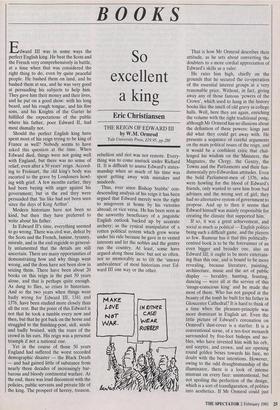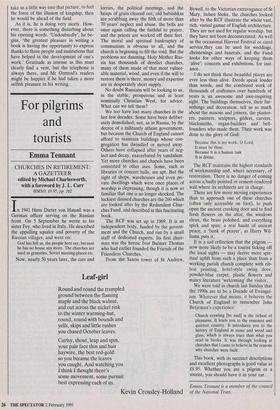BOOKS
So excellent a king
Eric Christiansen
THE REIGN OF EDWARD III by W.M. Ormrod Edward III was in some ways the perfect English king. He beat the Scots and the French very comprehensively in battle, at a time when that was considered the right thing to do, even by quite peaceful people. He bashed them on land, and he bashed them at sea, and he was very good at persuading his subjects to help him. They gave him their money and their lives, and he put on a good show: with his long beard, and his rough tongue, and his fine sons, and his Knights of the Garter he fulfilled the expectations of the public where his father, poor Edward II, had most dismally not.
Should the perfect English king have spent most of his reign trying to be king of France as well? Nobody seems to have asked this question at the time. When Edward died, things were not going well with England, but there was no sense of relief, even after a 50 years' reign. Accord- ing to Froissart, the old king's body was escorted to the grave by Londoners howl- ing with grief. A few months earlier, they had been baying with anger against his government; but in the end they were persuaded that 'his like had not been seen since the days of King Arthur'. Modern historians have not been so kind, but then they have preferred to write about his father.
In Edward II's time, everything seemed to go wrong. There was civil war, defeat by the Scots and the French, famine, tyranny, misrule, and in the end regicide so general- ly unlamented that the details are still uncertain. There are many opportunities of demonstrating how and why things went wrong, and the dons have not been slow in seizing them. There have been about 20 books on this reign in the past 50 years alone, and that is perhaps quite enough. As dung to flies, so crises to historians. And so the two years when things went badly wrong for Edward III, 1341 and 1376, have been studied more closely than all the rest. But the point of this Edward is not that he took a tumble every now and then, but that he got back on the horse and struggled to the finishing-post, sick, senile and badly bruised, with the roars of the crowd in his ears. His reign was a personal triumph if not a national one.
Yet in the course of those 50 years England had suffered the worst recorded demographic disaster — the Black Death — and had gained little of substance from nearly three decades of increasingly bar- barous and bloody continental warfare. At the end, there was loud discontent with the policies, public servants and private life of the king. The prospect of heresy, treason,
Yale University Press, L79.95, pp.280
rebellion and riot was not remote. Every- thing was to come unstuck under Richard II. It is difficult to assess Edward's states- manship when so much of his time was spent getting away with mistakes and misdeeds.
Thus, ever since Bishop Stubbs' con- descending analysis of his reign it has been argued that Edward merely won the right to misgovern at home by his victories abroad; or vice versa. He has been seen as the unworthy beneficiary of a jingoistic English outlook backed up by accurate archery; as the cynical manipulator of a rotten political system which grew worse under his rule because he gave in to vested interests and let the nobles and the gentry run the country. At least, some have argued along these lines: but not so often, nor so memorably as to tilt the 'uneasy ambivalence' of most historians over Ed- ward III one way or the other. That is how Mr Ormrod describes their attitude, as he sets about converting the doubters to a more cordial appreciation of Edward's skills as a ruler.
He rates him high, chiefly on the grounds that he secured the co-operation of the essential interest groups at a very reasonable price. Without, in fact, giving away any of those famous 'powers of the Crown', which used to hang in the history books like the smell of old gravy in college halls. Well, here they are again, enriching the volume with the right traditional pong, although Mr Ormrod has no illusions about the definition of these powers: kings just did what they could get away with. He presents a sequence of careful arguments on the main political issues of the reign, and it would be a confident critic that chal- lenged his wisdom on the Ministers, the Magnates, the Clergy, the Gentry, the Towns and the Parliaments and their fun- damentally pro-Edwardian attitudes. Even the bold Parliament-men of 1376, who were howling for the blood of Edward's friends, only wanted to save him from bad advisers and the wrong sort of girl; they had no alternative system of government to propose. And up to then it seems that Edward himself was mainly responsible for creating the climate that supported him.
If so, it was a great achievement, and social as much as political — English politics being such a difficult game, and the players so few. Rumour has it that this politically- centred book is to be the forerunner of an even bigger and broader one, also on Edward III; it ought to be more entertain- ing than this one, and is bound to be more revealing, because literature, painting, architecture, music and the art of public display — heraldry, hunting, feasting, dancing — were all at the service of this `image-conscious king' and he made the most of them. Who has not gasped at the beauty of the tomb he built for his father in Gloucester Cathedral? It is hard to think of a time when the pleasure-principle was more dominant in English art. Even the little picture of Edward's coronation on Ormrod's dust-cover is a startler. It is a conventional scene, of a ten-foot monarch surrounded by five-foot bishops and no- bles, who have invested him with his orb, and sceptre, and crown, and are opening round golden boxes towards his face, no doubt with the best intentions. However, owing to the odd draughtsmanship of the illuminator, there is a look of intense mistrust on every face: unintentional, but not spoiling the perfection of the design, which is a sort of transfiguration, of politics into aesthetics. If Mr Ormrod could just take us a little way into that picture, to feel the force of the illusion of kingship, then he would be ahead of the field.
As it is, he is doing very nicely. How- ever, there is something disturbing about his opening words. 'Undoubtedly', he be- gins, 'the greatest pleasure in writing a book is having the opportunity to express thanks to those people and institutions that have helped in the development of one's work.' Gratitude as intense as this must clearly find a vent, but the telephone is always there, and Mr Ormrod's readers might be happier if he had taken a more selfish pleasure in his writing.



















































 Previous page
Previous page